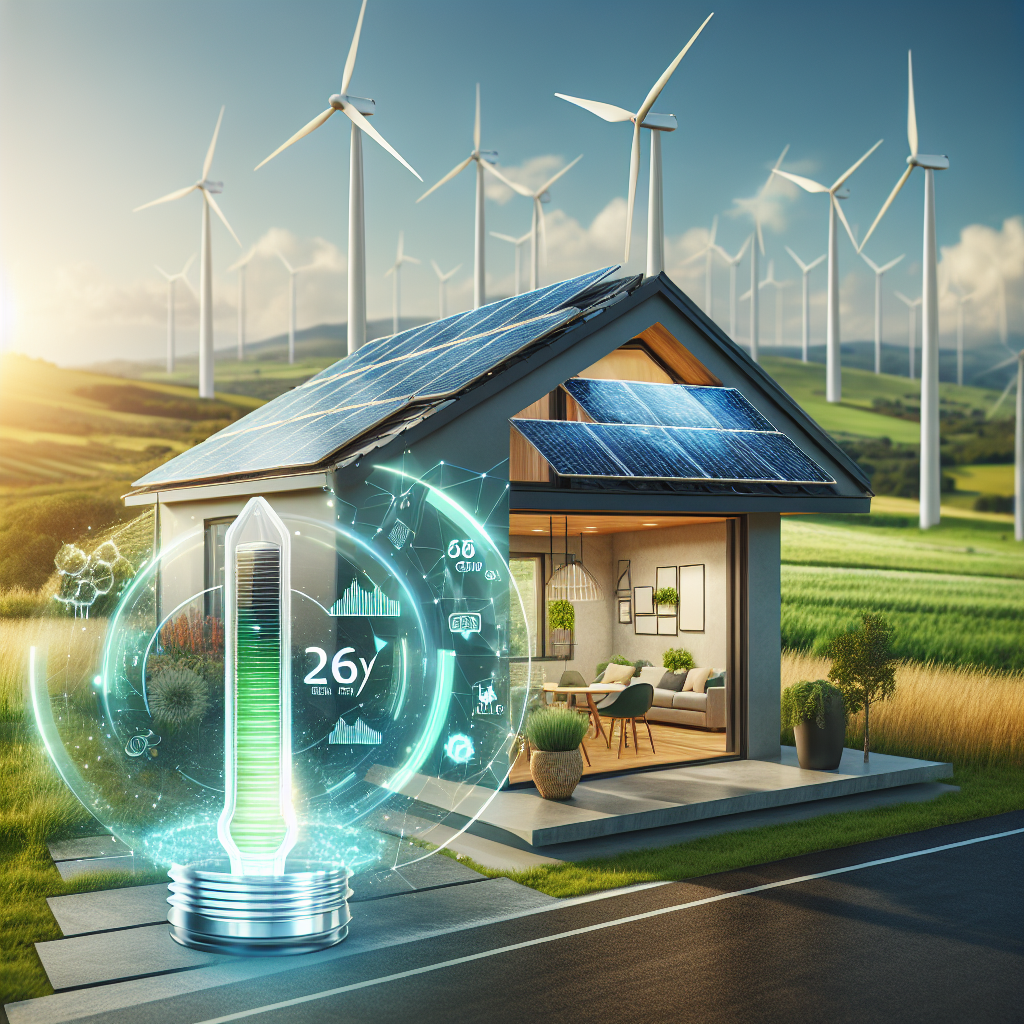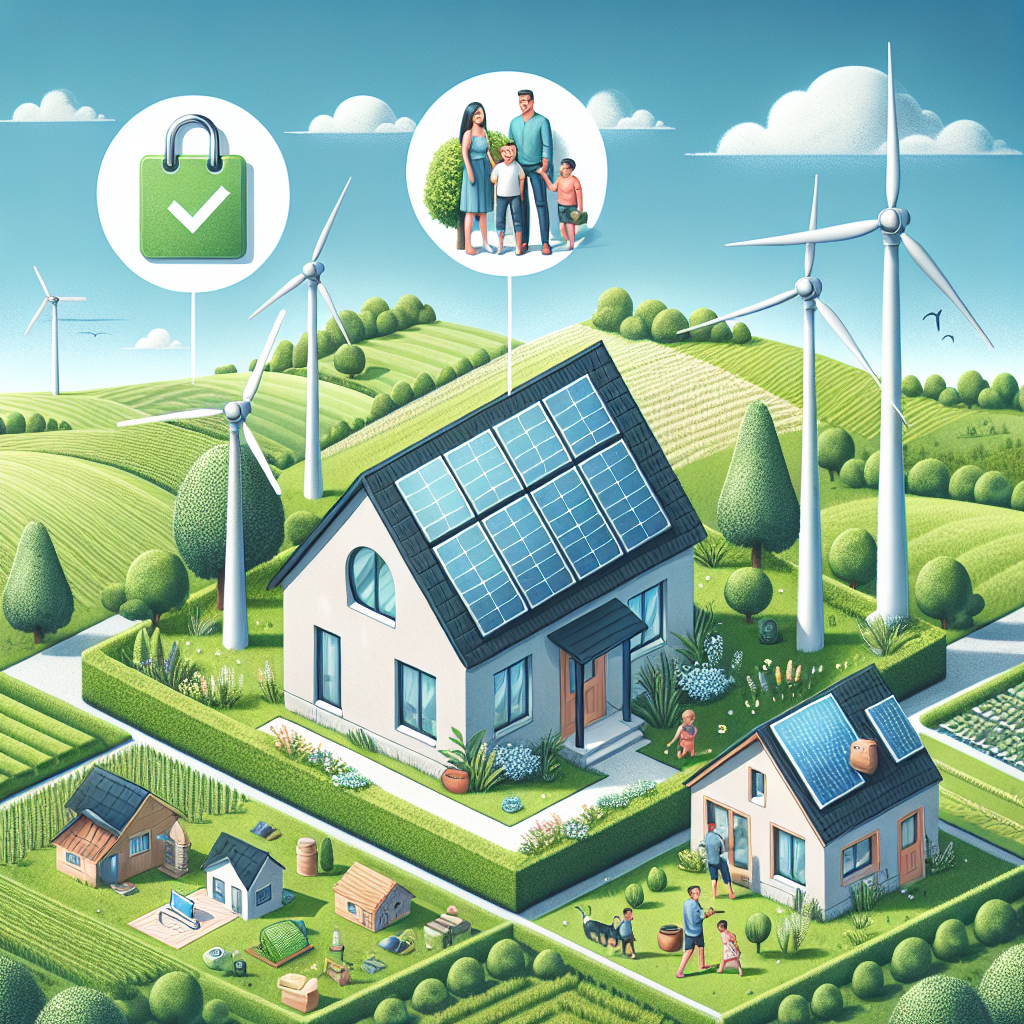In today’s world, finding cost-effective and sustainable energy sources for our homes is a top priority. Luckily, there are affordable options available that can help us reduce our carbon footprint while saving money in the long run. ‘Affordable Natural Energy Plans for Homes: A Comprehensive Guide’ is your go-to resource for exploring these options and making informed decisions about the best energy plan for your home. From solar panels to wind turbines, this guide covers everything you need to know about harnessing the power of nature to power your home. Say goodbye to high utility bills and hello to a more eco-friendly lifestyle with our comprehensive guide!
Understanding the Importance of Affordable Natural Energy Plans
In today’s world, the importance of affordable natural energy plans for homes cannot be overstated. As homeowners increasingly seek sustainable and cost-effective solutions, leveraging natural energy sources emerges as a viable option.
Benefits of using natural energy sources for homes
-
Cost-effectiveness: Natural energy sources, such as solar and wind power, can significantly reduce utility bills over time. While the initial investment may seem high, the long-term savings make it a financially prudent choice.
-
Environmental impact: Utilizing natural energy plans helps reduce the carbon footprint of homes, contributing to a cleaner and greener environment. By decreasing reliance on fossil fuels, homeowners can play a part in combating climate change.
-
Energy independence: Natural energy sources offer homeowners greater control over their energy production and consumption. This independence provides stability amidst fluctuating energy prices and grid outages.
-
Renewable and sustainable: Unlike finite fossil fuels, natural energy sources are renewable and abundant. Harnessing these sources ensures a continuous and sustainable energy supply for homes.
Impact on the environment and sustainability
-
Reduced greenhouse gas emissions: By shifting to natural energy plans, homes can significantly lower their greenhouse gas emissions. This transition is vital in mitigating climate change and preserving the planet for future generations.
-
Conservation of resources: Natural energy plans promote the efficient use of resources, such as sunlight and wind, without depleting them. This sustainable approach ensures that energy generation does not compromise the availability of resources for future use.
-
Promotion of eco-friendly practices: Embracing affordable natural energy plans encourages a culture of sustainability and environmental consciousness within communities. It sets a positive example for others to follow, fostering a collective effort towards a greener future.
In conclusion, understanding the importance of affordable natural energy plans for homes underscores the dual benefits of economic savings and environmental stewardship. By embracing these plans, homeowners can pave the way for a more sustainable and energy-efficient future.
Common Misconceptions about Natural Energy Plans

– Misconception 1: Natural energy plans are too expensive
One of the most common misconceptions about natural energy plans is that they are prohibitively expensive for homeowners. While it’s true that the initial investment in solar panels or wind turbines can be costly, it’s important to consider the long-term savings that can be achieved. In fact, many homeowners find that they are able to recoup their initial investment within a few years through reduced energy bills and potential tax incentives.
- Misconception 2: Natural energy plans are not effective
Another misconception is that natural energy plans are not as effective as traditional energy sources. However, advancements in technology have made natural energy solutions more efficient and reliable than ever before. Solar panels, for example, can now harness energy even on cloudy days, and wind turbines have become more streamlined and productive. Studies have shown that homes powered by natural energy sources can significantly reduce their carbon footprint and dependence on fossil fuels.

Factors to Consider When Choosing Affordable Natural Energy Plans
When considering affordable natural energy plans for your home, there are several crucial factors to take into account to ensure you make the most cost-effective and sustainable choice.
Evaluating the energy needs of your home
It is essential to conduct a thorough evaluation of your home’s energy requirements before selecting a natural energy plan. This assessment should include analyzing your historical energy consumption patterns, identifying peak usage times, and determining the specific energy demands of various appliances and systems within your home. By understanding your energy needs, you can choose a plan that is tailored to meet your requirements efficiently.
Assessing the initial investment and long-term savings
Another key factor to consider when selecting an affordable natural energy plan is the initial investment required and the potential long-term savings it can offer. While some natural energy solutions may have higher upfront costs, they often result in substantial savings over time due to reduced reliance on traditional energy sources. It is crucial to weigh the initial expenses against the projected savings to determine the overall cost-effectiveness of the chosen plan.
Researching available incentives and rebates
Before finalizing your decision on a natural energy plan, it is advisable to research the incentives and rebates available for renewable energy systems in your area. Many governments and utility companies offer financial incentives to encourage homeowners to adopt sustainable energy solutions, such as solar panels or geothermal heating. By taking advantage of these incentives, you can significantly reduce the overall cost of implementing a natural energy plan for your home.
Exploring Different Types of Natural Energy Sources
Solar Energy
Solar energy is a popular choice for homeowners seeking to harness natural energy sources for their homes. Here are some key points to consider when exploring solar energy options:
Pros and Cons of Solar Panels for Residential Use
- Pros:
- Solar panels can significantly reduce electricity bills over time, providing long-term cost savings.
- Solar energy is a renewable resource, making it environmentally friendly and sustainable.
- Solar panels require minimal maintenance and have a long lifespan, typically lasting 25-30 years.
-
Installing solar panels can increase the resale value of a home.
-
Cons:
- The initial cost of purchasing and installing solar panels can be high, although there are now more affordable options available.
- Solar panels are dependent on sunlight, so energy production may fluctuate based on weather conditions.
- Not all homes are suitable for solar panel installation due to factors such as roof orientation, shading, and structural limitations.
Understanding Net Metering and Grid-Tied Systems
- Net Metering:
- Net metering is a billing arrangement that allows homeowners with solar panels to receive credit for excess electricity generated and fed back into the grid.
-
This system enables homeowners to offset the cost of electricity drawn from the grid by exporting surplus energy when their solar panels produce more electricity than is needed.
-
Grid-Tied Systems:
- Grid-tied solar systems are connected to the utility grid, allowing homeowners to draw electricity from the grid when solar production is insufficient.
- Excess energy generated by the solar panels can be exported to the grid, earning credits or compensation from the utility company.
- Grid-tied systems eliminate the need for battery storage, reducing overall costs and maintenance requirements.
Wind Power
-
Overview of Wind Turbines for Residential Energy Production
Wind power is a renewable energy source that can be harnessed through the use of wind turbines for residential energy production. These turbines typically consist of rotor blades connected to a generator, which converts the kinetic energy of the wind into electricity. They come in various sizes, from smaller models suitable for individual homes to larger systems that can power entire communities. -
Considerations for Location and Maintenance
When considering wind power for your home, it is important to assess the suitability of your location. Areas with consistent and strong wind patterns are ideal for maximizing energy production. Additionally, the installation of wind turbines requires regular maintenance to ensure optimal performance. This includes periodic inspections, lubrication of moving parts, and potential repairs in case of damage. Engaging with professional installers and adhering to maintenance schedules can help ensure the long-term effectiveness of your wind power system.
Geothermal Energy
Geothermal energy stands out as a promising natural energy source for homes, offering a sustainable and cost-effective solution for heating and cooling needs. Geothermal heat pumps utilize the constant temperature of the earth below the surface to provide efficient heating in the winter and cooling in the summer. These systems can significantly reduce energy bills over time, making them a smart investment for homeowners looking to lower their utility costs.
How geothermal heat pumps can provide affordable heating and cooling
Geothermal heat pumps work by transferring heat between the earth and the home, effectively leveraging the stable underground temperatures to regulate indoor climate. Unlike traditional heating and cooling systems that rely on fossil fuels or electricity, geothermal systems use the earth’s natural heat, making them highly efficient and environmentally friendly. By tapping into this renewable energy source, homeowners can enjoy consistent and reliable heating and cooling without the hefty price tag often associated with conventional HVAC systems.
Installation and operational costs of geothermal systems

While the upfront cost of installing a geothermal heat pump may be higher than traditional heating and cooling systems, the long-term savings can outweigh the initial investment. The installation process involves burying pipes underground to facilitate heat exchange, requiring professional expertise for optimal performance. However, once installed, geothermal systems have lower operational costs since they are more energy-efficient and require less maintenance compared to conventional HVAC units. Homeowners can recoup the installation costs through reduced energy bills and potential tax incentives or rebates offered for using renewable energy sources.
Implementing Affordable Natural Energy Plans in Your Home
- Working with a Professional Energy Consultant
Engaging with a professional energy consultant can provide valuable insights into the most cost-effective and efficient natural energy solutions for your home. These experts can assess your property, analyze your energy consumption patterns, and recommend tailored strategies to reduce reliance on traditional energy sources. By collaborating with a consultant, homeowners can benefit from customized plans that maximize the use of renewable resources while minimizing overall costs.
- DIY Options for Incorporating Natural Energy Sources
For those looking to take a hands-on approach, there are various do-it-yourself (DIY) options available for integrating natural energy sources into their homes. From installing solar panels and wind turbines to implementing geothermal heating systems, DIY projects can offer a more affordable alternative to professional installations. However, it is essential to research thoroughly, adhere to safety guidelines, and consult with experts if needed to ensure the effectiveness and safety of DIY natural energy solutions.
- Monitoring and Optimizing Energy Usage for Maximum Savings
Once natural energy plans are in place, monitoring and optimizing energy usage play a crucial role in maximizing savings and efficiency. Utilizing smart meters, energy monitoring systems, and programmable thermostats can help homeowners track their energy consumption in real-time and make informed decisions to reduce waste. By analyzing data and adjusting energy usage habits accordingly, individuals can achieve significant cost savings while minimizing their environmental impact.
Case Studies: Successful Integration of Natural Energy Plans
Real-life examples of homes benefiting from affordable natural energy solutions
In a recent case study conducted in a suburban area, the Johnson family successfully integrated solar panels on their roof, significantly reducing their reliance on the grid. By harnessing the power of the sun, they were able to generate enough electricity to cover 80% of their household’s energy needs. This shift not only resulted in substantial cost savings on their monthly utility bills but also allowed them to contribute to a greener, more sustainable environment.
Cost-saving measures and environmental impact of renewable energy implementation
Another noteworthy example is the Smith residence, which implemented a geothermal heating and cooling system. By tapping into the stable temperature of the earth below the surface, the Smiths were able to regulate their home’s climate more efficiently and affordably. This initiative not only reduced their energy expenses by 30% but also significantly lowered their carbon footprint, making a tangible impact on combating climate change.
Through these case studies, it becomes evident that affordable natural energy plans for homes are not only feasible but also highly beneficial both economically and environmentally. By leveraging renewable energy sources such as solar and geothermal power, homeowners can take proactive steps towards a more sustainable future while enjoying long-term cost savings.
FAQs – Affordable Natural Energy Plans for Homes: A Comprehensive Guide
What are affordable natural energy plans for homes?
Affordable natural energy plans for homes involve utilizing renewable energy sources such as solar, wind, or geothermal energy to power your home. These plans are designed to reduce your reliance on traditional fossil fuels, lower your energy bills, and decrease your carbon footprint.
How can I find affordable natural energy plans for my home?
To find affordable natural energy plans for your home, start by researching different energy providers in your area that offer renewable energy options. Look for incentives, rebates, and tax credits that may help offset the costs of installing solar panels or other renewable energy systems. You can also consult with a local energy consultant or contractor who specializes in renewable energy to help you find the best plan for your home.
What are the benefits of switching to affordable natural energy plans for homes?
Switching to affordable natural energy plans for homes can have several benefits. Not only will you save money on your energy bills in the long run, but you will also reduce your carbon footprint and contribute to a cleaner, more sustainable environment. Additionally, using renewable energy sources can increase the value of your home and make it more attractive to potential buyers in the future.
Are there any drawbacks to using affordable natural energy plans for homes?
While affordable natural energy plans for homes have many benefits, there are also some drawbacks to consider. The initial cost of installing renewable energy systems such as solar panels can be expensive, although there are often incentives and financing options available to help offset these costs. Additionally, renewable energy sources may not be as reliable as traditional fossil fuels, especially in areas with inconsistent weather patterns.
How can I determine if affordable natural energy plans are suitable for my home?
To determine if affordable natural energy plans are suitable for your home, consider factors such as your energy usage, the availability of renewable energy sources in your area, and the potential cost savings over time. You can also conduct a home energy audit to identify areas where you can improve energy efficiency before investing in renewable energy systems. Consulting with a professional energy advisor can also help you make an informed decision about switching to natural energy plans for your home.